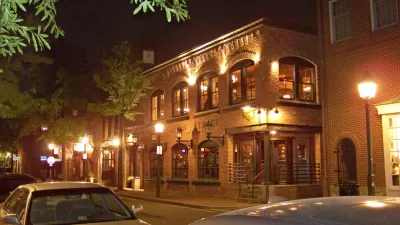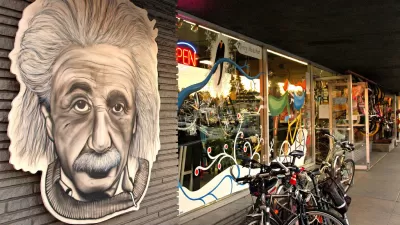Transportation
Memphis Pedals Cycling as Economic Salve
One of the America's most unhealthy, auto-centric cities has seen the light - the handlebar headlight that is - with a push to improve its bicycling infrastructure as a means of economic development.
A Modest Proposal for Protecting L.A.'s Pedestrians
Commentator D.J. Waldie laments the stunning health hazards for L.A.'s pedestrians, and proposes five solutions to make the city safer for those on foot.
A New Year's Eve Call to Action for Urbanists
We've known for decades the better ways to do things, for greater urban health, sustainability, resiliency, vibrancy and economic success. So this year, let's resolve to have the will and skill to get past the short-term politics, the rhetoric, the market momentum, and the financial self-interest that has kept our better solutions from being realized.
Redesign of Bay Area's El Camino Real is a Royal Pain
One road, two counties, 19 cites - that's what and who is involved in a far-reaching plan to redesign El Camino Real, the first paved road in California, from Daly City in northern San Mateo County to San Jose in the heart of Santa Clara County.
In South Africa, Imagining Bicycles as a Vehicle for Empowerment
Bicyclists are hard to come by in South Africa. Two authors have gone in search of the reasons why a country with "so much poverty, often unwalkable commuter distances, and poor public transportation," lacks a larger bike culture.
Tactical Urbanism: A Look Back at 2012
From guerrilla wayfinding to future-tising, these are my top five, perhaps lesser known, highlights of a banner year for Tactical Urbanism.
'App Breakthrough' Benefits NYC Straphangers
Friday marked a milestone in the effort to bridge the gap between NYC's century-old subway system and emerging technologies; "a leap forward for a service that has lagged behind its peers both at home and abroad in adopting new technologies."
From Housing Planes to People: Repurposing Success Stories
As cities across the world look to convert aging and obsolete airfields to new uses, a growing body of repurposing success stories show "how problematic properties can be successfully converted," reports Christine Negroni.

Removing Sidewalks to Make Room for Peds
WAMU's Michael Pope reports on an Alexandria, VA's plan to level the playing field for bikes, pedestrians and cars by taking out curbs.

World's Longest High-Speed Rail Line Opens
The opening of the 1,200-mile Beijing to Guangzhou high-speed rail line marked the latest milestone in "one of the world’s largest and most ambitious infrastructure projects." The longest such segment in the world takes only 8 hours to traverse.
New York's MTA Seeks New Leader
Joseph Lhota, the chairman and chief executive of the Metropolitan Transportation Authority, has announced his resignation at the end of this year. Who will be next to lead the nation's largest public transportation system?
Midwestern Drought Threatens the Mississippi River
The Mississippi River handles $7 billion in trade as one of the world's largest navigable inland waterways. A Midwestern drought has brought the river to water levels so low that they threaten to shut down shipping, reports John Schwartz.
Trainjacking America's Finance Industry
Acela has improved connectivity along the Northeast Corridor, but is that actually a good thing? Aaron M. Renn argues that high-speed rail has actually hurt America by giving the finance industry a stranglehold over fiscal and monetary policies.
Proximity Trumps Mobility: Smart Growth Maximizes Accessibility
The increased proximity provided by more compact and centralized development is about ten times more influential than vehicle traffic speed on the number of destinations that people can reach within a given travel time.
How Smart Is Smart Parking - And For Whom?
Parking enforcers, not motorists in search of available parking, may be the main beneficiaries of 'smart parking' technology as they have the ability to immediately spot parking spaces where vehicles have overstayed their time limits and by how long.
Can Narrow Lanes Improve Traffic Congestion?
Comparing wide versus narrow lanes, Kenneth A. Small and Chen Feng Ng examine the relatively unexplored design of building more compact roads to alleviate traffic congestion.
Biometric Monitors: Coming to a Driveway Near You
Might your car one day serve as a mobile doctor's office? If research into biometric monitoring being conducted by carmakers comes to fruition, your car may soon be able to tracks your stress and blood sugar levels, and more, reports Bob Moon.
'Cycle to Work' Scheme Subsidizes Bikes for Brits
Sarah Goodyear reports on how Britain's 'Cycle to Work' scheme has decreased carbon dioxide emissions, and transformed the lives of individuals such as Toby Field.
Why is Little Being Done to Prevent Railroad Deaths?
An investigative series by the St. Louis Post-Dispatch exposes the obstacles to preventing pedestrian railroad accidents - now the leading cause of death on the rails. Authorities are unable to tackle the problem and railroads are unwilling.

Bicycling: Good for the Brain and the Body
The physical benefits of cycling are well known, but researchers are just beginning to understand how riding a bike benefits our brains, writes Simon Usborne.
Pagination
Urban Design for Planners 1: Software Tools
This six-course series explores essential urban design concepts using open source software and equips planners with the tools they need to participate fully in the urban design process.
Planning for Universal Design
Learn the tools for implementing Universal Design in planning regulations.
Borough of Carlisle
Smith Gee Studio
City of Camden Redevelopment Agency
City of Astoria
Transportation Research & Education Center (TREC) at Portland State University
City of Camden Redevelopment Agency
Municipality of Princeton (NJ)


































